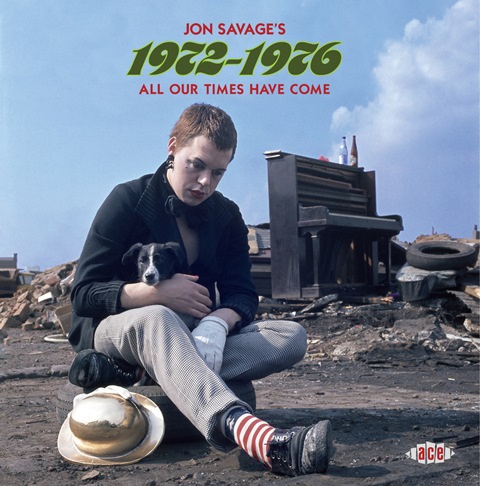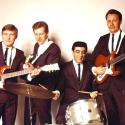Close to the back of Jon Savage’s 1991 book England’s Dreaming, there’s a section titled “Discography.” In this, he goes through the records which fed into and were spawned by punk rock and the Sex Pistols, the book’s subject. The wide-ranging selection begins with Fifties rock ’n roll and Max Bygraves, and ends with the “post-house dance music” of The Justified Ancients Of Mu and Renegade Soundwave.
When the mid-Seventies are reached, he says “the Murray Head 45 ‘Say it Ain’t so’ referred to in Chapter Nine is long deleted.” This chapter examines the birth of the Sex Pistols: tracking John Lydon’s first encounter with the rest of the would-be band. Head’s lyrics are quoted: “The image and the empire may be falling apart/ The money has gotten scarce/ One man's word held the country together/ But the truth is getting fierce.” Released in October 1975, the single captured a Britain in decline.
 “Say it Ain’t so” crops up again on the new double-CD set, Jon Savage's 1972–1976 – All Our Times Have Come. Writing in the accompanying booklet, Savage now describes the single as “Head’s regretful address to a derelict and destroyed country” and “summ[ing] up a country in disintegration.” Fittingly, capturing this, the compilation's striking cover image is a 1974 photo of Rod Melvin of The Moodies, an art-school provocateur group which never recorded.
“Say it Ain’t so” crops up again on the new double-CD set, Jon Savage's 1972–1976 – All Our Times Have Come. Writing in the accompanying booklet, Savage now describes the single as “Head’s regretful address to a derelict and destroyed country” and “summ[ing] up a country in disintegration.” Fittingly, capturing this, the compilation's striking cover image is a 1974 photo of Rod Melvin of The Moodies, an art-school provocateur group which never recorded.
All Our Times Have Come is the sixth CD set tying-in to Savage's 2015 book 1966 – The Year The Decade Exploded. The first comp was dedicated to 1966. It was followed by sets collecting music from singles issued in 1965, 1967, 1968 and 1969–1971. Effectively, as “Say it Ain’t so” underlines, All Our Times Have Come and the other CDs are the thread linking the two books.
More personally perhaps, All Our Times Have Come traces Savage himself en route to and in 1976, the supposed year zero of punk rock, the year he took his first active steps towards chronicling music and setting it in its context. He began working on his fanzine Londons Outrage at the end of November 1976.
Also in the booklet, he credits the written word as inspirational: to him, and to what was going on in music. America’s Creem, Fusion, Rolling Stone, and Greg Shaw’s important Who Put The Bomp are mentioned. So are the UK’s Cream, Dark Star, Fat Angel, Hot Wacks, Let It Rock, ZigZag and Brian Hogg’s similarly important Bam Balam (Bam Balam took its name from a Flamin’ Groovies song, Who Put The Bomp featured the Groovies, and Shaw managed them and issued their records – the Groovies were a lodestone and are on All Our Times Have Come). These were not the music weeklies but labours of love arising from the “critic/activist culture.” Savage says “the fertility of these publications gives the lie to the tenet that the early ’70s were drab and featureless.” Of course, more than this laid the table for punk but independently minded music writing was key to fomenting it, shaping it and giving it a platform.
 Track One of All Our Times Have Come is Little Feat’s “Easy to Slip”. They were an alternative. The second disc ends with The Count Bishops’ wonderful, atmospheric “Train, Train”. In between there’s punk and punkishness with The Ramones’ “Blitzkrieg Bop” and ideologically aligned kin-folks: Blondie’s “X Offender”, Wayne County & the Backstreet Boys’ “Max's Kansas City”, Nick Lowe’s “Heart of the City", Pere Ubu’s “Final Solution” and The Runaways’ “Cherry Bomb”. As well as The Count Bishops, pub rock is represented by Dr. Feelgood, Eddie & the Hot Rods and The 101’ers.
Track One of All Our Times Have Come is Little Feat’s “Easy to Slip”. They were an alternative. The second disc ends with The Count Bishops’ wonderful, atmospheric “Train, Train”. In between there’s punk and punkishness with The Ramones’ “Blitzkrieg Bop” and ideologically aligned kin-folks: Blondie’s “X Offender”, Wayne County & the Backstreet Boys’ “Max's Kansas City”, Nick Lowe’s “Heart of the City", Pere Ubu’s “Final Solution” and The Runaways’ “Cherry Bomb”. As well as The Count Bishops, pub rock is represented by Dr. Feelgood, Eddie & the Hot Rods and The 101’ers.
Mainstream disruptors are here: Mott The Hoople, Lou Reed, Sparks, The Sweet and more. There’re also those with high-profile pasts who, like Lou Reed, hadn’t given up on reframing themselves: The Byrds’ “Full Circle”, John Lennon’s “#9 Dream”, The Move’s “Do Ya”. And there’s those embracing the lost vitality of the past to create an energy for the present: Smyle’s “She Means a Lot to me”, The Hammersmith Gorillas’ “You Really Got me.” Given the compilation’s time frame and that they issued singles in 1976, The Damned, the Sex Pistols and even The Vibrators could be here, but they are not. This particular path takes it to just short of lift off, before the actual moment of punky ascendance.
Whether this all combines to inescapably create the punk rock boom and what followed in 1977 is moot. The flow feels right, as though this an accurate account of an evolution. Although Joe Strummer is here with The 101'ers, the abscence of the earliest Brit-punk bands means that the what-if of what came next hangs intriguingly in the air. It's a reservation which helps make Jon Savage's 1972–1976 – All Our Times Have Come a great listen, one that doesn’t state the obvious.
- Next week: 10th-anniversary repackage of Tame Impala's Innerspeaker
- More reissue reviews on theartsdesk
- Kieron Tyler’s website















Add comment